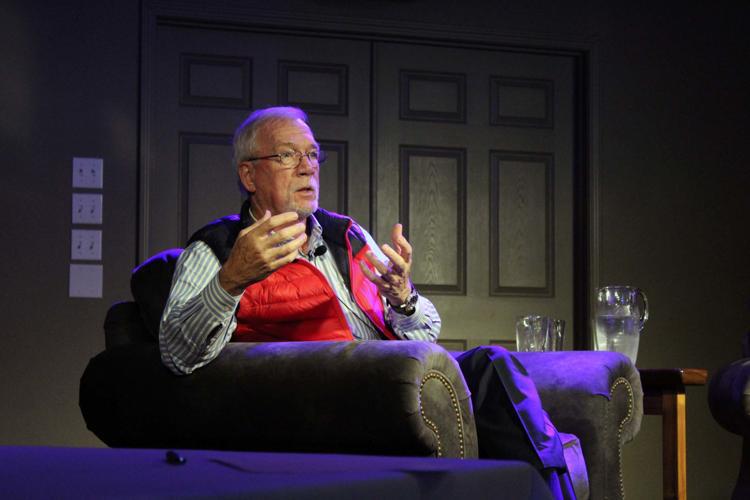|
Veteran journalist, subject of Academy Award winning film speaks in Wasilla
By Tim Rockey
Award-winning journalist and subject of the Academy Award winning 2015 film “Spotlight,” Walter ‘Robby’ Robinson, shared some insights and wisdom of a career spanning nearly five decades in journalism during an afternoon in Wasilla Thursday. His work as part of the Spotlight team at the Boston Globe led to more than 600 stories detailing systemic abuse by the Catholic Church and subsequent cover-ups in Boston. Robinson, who was portrayed by actor Michael Keaton in the film, discussed journalism in the age of the Internet, principles of journalism, and growing fear for those doing investigative reporting, though not necessarily in the United States. Robinson answered questions for Frontiersman staff prior to a luncheon at Everett’s in Wasilla attended by public officials, teachers, dignitaries and others who wanted to hear what the award-winning journalist had to say. Robinson had a variety of takes on all sorts of touchy topics, but used numbers at the start of the event to hammer home a point. “Buy the damn paper,” said Robinson. “It doesn’t cost that much.” Robinson — using a combination of quick wit, sense of humor and vast knowledge of the industry — went on to detail that he felt if someone were to turn off cable television news for a week and only get your information from the newspaper, one would be better informed, have improved digestion and sleeping habits as a result of reading the newspaper. By Robinson’s account, newspapers in the United States had an advertising revenue of $69 billion in the early 2000’s, a number which was down to $19 billion in 2014. Robinson also said that there were 25,000 daily newspaper reporters in 1999, and in 2015 there were only 13,000. Robinson took the stage with UAA Atwood Chair of Journalism Tim Bradner and Julie Brady, Commissioner of Natural Resources and former Fairbanks Daily News-Miner reporter. Most questions were directed at Robinson, who answered with examples from his extensive history in journalism, spanning 33 countries, 48 states, and 46 years. Robinson has worked at the Boston Globe for 34 years, and is still an Editor At-Large. Robinson covered politics at the Globe as a reporter and editor, and won a Pulitzer Prize for Public Service in 2003 as a result of the exposure of the Catholic Clergy sexual abuse scandal. Robinson currently teaches at Arizona State University in the Walter Cronkite School of Journalism. “What is left to be unasked and how do we solve the sexual abuse problem?” Republican gubernatorial candidate Mead Treadwell asked during the luncheon. “Issues of sexual misconduct in the workplace is an epidemic. The issue gets more media attention and the more we report, the more people that come forward. The stigma and the shame diminishes,” Robinson said. “Workplaces are revisiting conduct rules,. I’m hopeful results will turn out better for all of us and children.” Robinson studied a textbook titled “Objective Journalism” in college, but that objective journalism may be a myth. “If that reporter doesn’t have an opinion, what’s the depth of the passion?,” Robinson said. “If you have a view you have extra obligation to make sure the other side gets at least equal hearing. It’s always applicable to political conversation.” Robinson felt that reporters have obligation to print the facts. He warned newspapers from endorsing political candidates. Even with a diminished Republican party in Massachusetts, Robinson saw multiple Democratic leaders sentenced for crimes that journalists helped expose. “My motto is to walk down the middle of the street and shoot out windows on both sides,” said Robinson. Robinson discussed at length the relationship between journalism and democracy. He charged newspapers with continuing education in civics, all the time. “Newspapers are the lifeblood of communities, a community gathering spot,” said Robinson. Robinson also spent time with Frontiersman staff, answering industry questions and offered strategies to support investigative journalism. “Working with small groups of reporters, push them to ask more questions and go to places you wouldn’t ordinarily go,” said Robinson. The Spotlight team that focused on investigative stories at the Globe was only four when they uncovered the Catholic scandal. Now, 11 reporters are on the spotlight team. “Any large rock that hasn’t been turned over is going to have something under it,” Robinson said. “ We owe it to society and our readers to give these institutions greater scrutiny.” Robinson mentioned the difficulty of unnamed sources, and his strategies to prove to the source that attaching their name would give the story credibility. Robinson also gave his criteria for what makes a good investigative story when determining what to report. “Is it a high impact story? If so, is it of interest to the readers? And if we publish, will it lead to a change or reform?” said Robinson. While journalism jobs dwindle and newspapers lose readers to internet sources every day, Robinson urged that investigative reporting that holds people accountable resonates with readers more than the sports page in Boston when the Patriots are winning. “If you’re going to effect change, print the facts!,” said Robinson.
|
.
Any original material on these pages is copyright © BishopAccountability.org 2004. Reproduce freely with attribution.
